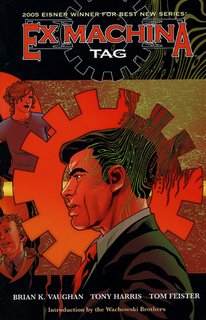Catching Up
When I'm not buying new comics, I'm catching up on old comics that I missed the first time around. This is a lot easier these days, what with the proliferation of the trade paperback form. The drawback is, and maybe it's just me, the thrill of the hunt is gone. To me, half the fun of reading comics when I was a kid was trying to find a crucial back issue to fill a hole in one's collection. Now I derive my fun by discovering great series I missed in convenient trade form, prepackaged to go on my shelf with other works of literature.
 I've been getting caught up on Brian K. Vaughan's and Tony Harris' Ex Machina through the trades lately. I've been a fan of Harris' work since his time on Starman. I don't know why I missed this series when it first came out. I can probably chalk it up to one of my dark periods, where I was only coming into the LCS every three of four months, not really buying anything.
I've been getting caught up on Brian K. Vaughan's and Tony Harris' Ex Machina through the trades lately. I've been a fan of Harris' work since his time on Starman. I don't know why I missed this series when it first came out. I can probably chalk it up to one of my dark periods, where I was only coming into the LCS every three of four months, not really buying anything.I read the first Ex Machina trade a while ago, and was a bit underwhelmed at parts of it. I decided to give it another try; there just seemed to be too much potential there to go wasted.
The series definitely smoothes out in the second trade, so much so that after finishing it, I went out and got the third one right away. It's a compelling story with snappy dialogue and powerful themes.
 I think the main appeal is context. We're at a point in our pop culture where we're feeling the weight and stress of tragedy. A lot of genre themes explored in the wake of 9/11 have centered on the dead that cannot rest (zombies, ghosts) and the abilty to change or discover the past (time travel, flashback-based reveals). One of the main conceits of Ex Machina is that Mitch Hundred was able to prevent at least one of the Twin Towers from falling on 9/11, though that doesn't necessarily mean that events that follow are drastically changed. The fictional world pretty much hews to the course of the real one.
I think the main appeal is context. We're at a point in our pop culture where we're feeling the weight and stress of tragedy. A lot of genre themes explored in the wake of 9/11 have centered on the dead that cannot rest (zombies, ghosts) and the abilty to change or discover the past (time travel, flashback-based reveals). One of the main conceits of Ex Machina is that Mitch Hundred was able to prevent at least one of the Twin Towers from falling on 9/11, though that doesn't necessarily mean that events that follow are drastically changed. The fictional world pretty much hews to the course of the real one. I'm looking forward to some of the developing mysteries, mainly: Where does Hundred get his powers from, and what does that mean? The second trade was particularly creepy in it's implications. Not that it gave me nightmares, but I did read it late at night and found ot hard to sleep after.
 Also, a while ago, I managed to pick up a near-complete run of Robert Morales' and Kyle Baker's Truth. I had bought the first issue when it first came out, and really looked forward to the rest, but somehow I missed out. I believe it may have been a combination of my LCS not bothering to carry it, and I simply forgot to look for it.
Also, a while ago, I managed to pick up a near-complete run of Robert Morales' and Kyle Baker's Truth. I had bought the first issue when it first came out, and really looked forward to the rest, but somehow I missed out. I believe it may have been a combination of my LCS not bothering to carry it, and I simply forgot to look for it.After finishing it, I have a number of mixed feelings about it. Don't get me wrong, I loved it... it's probably the fact that it left me a bit churned up inside that makes me love it.
In summary, the story proposes to tell the true story of the development of Marvel's super-soldier serum. You know, the one that gave birth to Captain America. Grafting real-world incidents like the Tuskegee syphillis experiment into the story, Truth shows that Steve Rogers wasn't the only guinea pig, but he was the only willing one.
It's a thought-provoking story. It tarnishes Cap's origin story slightly, but adds complexity to the Marvel U. I'm not sure if it's entirely in canon, but it should be. Honestly, Cap needs it. He's a great character, but so often is a cardboard cutout. This retcon of his origin underscores everything he should stand for.
Tags: ex machina truth captain america


0 Comments:
Post a Comment
<< Home